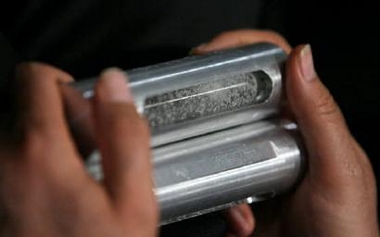Iran's hard-line president said Tuesday that the country "has joined the club
of nuclear countries" by successfully enriching uranium for the first time — a
key process in what Iran maintains is a peaceful energy program.

An Iranian official
holds a capsule of uranium hexaflouride, or UF6 gas during a ceremony in
Mashhad, Iran's holiest city Tuesday, April 11, 2006. Iran has
successfully enriched uranium for the first time, a landmark in its quest
to develop nuclear fuel, hard-line President Mahmoud Ahmadinejad said
Tuesday, although he insisted his country does not aim to develop atomic
weapons. In a nationally televised speech, Ahmadinejad called on the West
'not to cause an everlasting hatred in the hearts of Iranians' by trying
to force Iran to abandon uranium enrichment.
[AP] |
The announcement from President Mahmoud Ahmadinejad was certain to heighten
international tensions surrounding Iran's nuclear program. The U.N. Security
Council has demanded that Iran stop all enrichment by April 28 because of
suspicions the program is designed to make nuclear weapons.
Ahmadinejad warned the West that trying to force it to abandon uranium
enrichment would "cause an everlasting hatred in the hearts of Iranians."
The head of the U.N. nuclear watchdog agency, Mohamed ElBaradei, was heading
to Iran on Wednesday for talks aimed at resolving the standoff. The timing of
the announcement suggested Iran wanted to present him with a fait accompli and
argue that it cannot be expected to entirely give up a program showing progress.
Former president Hashemi Rafsanjani, a powerful member of Iran's ruling
clerical regime, said the breakthrough means ElBaradei "faces new
circumstances."
The White House, which is pressing for U.N. sanctions against Iran, said the
enrichment claims "show that Iran is moving in the wrong direction."
"Defiant statements and actions only further isolate the regime from the rest
of the world," said White House spokesman Scott McClellan.
Britain's Foreign Office issued a statement reiterating the U.N. call for a
halt to enrichment work and warned that "if Iran does not comply, the Security
Council will revisit the issue."
The Iranian enrichment announcement "is not particularly helpful," it said.
Uranium enrichment can produce either fuel for a nuclear energy reactor — as
Iran says it seeks — or the material needed for an atomic warhead.
Tuesday's announcement does not mean Iran is immediately capable of doing
either. So far it has succeeded only in getting a series of 164 centrifuges to
work in the enrichment process. Thousands of centrifuges are needed for a
workable program.
But successfully carrying out the highly complicated and delicate process
even on a small scale would be a breakthrough, and Iran's nuclear chief said the
program would be expanded to 3,000 centrifuges by the end of the year.
Ahmadinejad announced it at a nationally televised ceremony clearly aimed at
drumming up popular Iranian support for the nuclear program. He addressed an
audience that included top military commanders and clerics in an ornate hall in
one of Iran's holiest cities, Mashhad. Before he spoke, screens on the stage
showed footage of nuclear facilities and scientists at work.
"At this historic moment, with the blessings of God Almighty and the efforts
made by our scientists, I declare here that the laboratory-scale nuclear fuel
cycle has been completed and young scientists produced enriched uranium needed
to the degree for nuclear power plants Sunday," Ahmadinejad said.
"I formally declare that Iran has joined the club of nuclear countries," he
said. The crowd broke into cheers of "Allahu akbar," or "God is great."
As part of the ceremony, costumed dancers performed on the stage, holding
aloft vials of raw uranium and also chanting "Allahu akbar."
Ahmadinejad said the West "has to respect Iran's right for nuclear energy."
He said Iran wanted to operate its nuclear program under supervision by the
International Atomic Energy Agency and within its rights and the regulations of
the Nuclear Non-Proliferation Treaty.
According to the IAEA, a total of 31 countries have nuclear power plants
either in operation or under construction.
In Vienna, officials of the IAEA, whose inspectors are now in Iran, declined
to comment on Ahmadinejad's announcement.
But a diplomat familiar with Tehran's enrichment program said it appeared to
be accurate. He demanded anonymity because he was not authorized to discuss
information restricted to the agency.
Speaking before the president, Iran's nuclear chief — Vice President
Gholamreza Aghazadeh — told the audience that Iran has produced 110 tons of
uranium gas, the feedstock that is pumped into centrifuges for enrichment.
The amount is nearly twice the 60 tons that Iran said last year that it had
produced — an amount that former U.N. nuclear inspector David Albright said
would be enough to produce up to 20 nuclear bombs if Iran developed the
capacity.
Aghazadeh also said a heavy water nuclear reactor, under construction near
Arak in central Iran, will be completed by early 2009. The U.S. fears that the
spent fuel from a heavy-water reactor can be reprocessed to extract plutonium
for use in a bomb.
The IAEA is due to report to the U.N. Security Council on April 28 whether
Iran has met its demand for a full halt to uranium enrichment. If Tehran fails
to comply, the U.S. and Europe are pressing for sanctions against Iran, a step
Russia and China have opposed.
Under the non-proliferation pact, nations without nuclear weapons pledge not
to pursue them in exchange for a commitment by five nuclear-weapons states — the
United States, Russia, Britain, France and China — to negotiate nuclear
disarmament. The treaty guarantees countries that renounce nuclear weapons
access to nuclear technology for peaceful purposes.